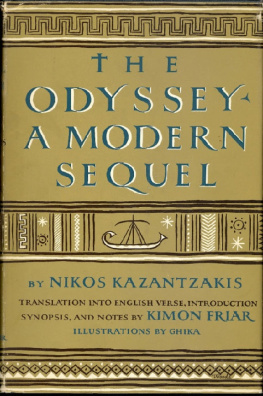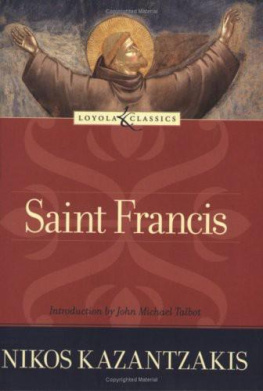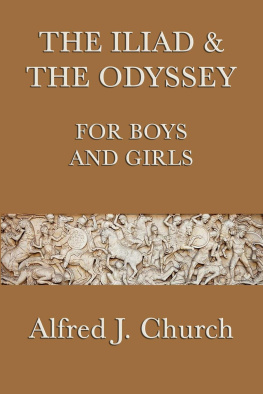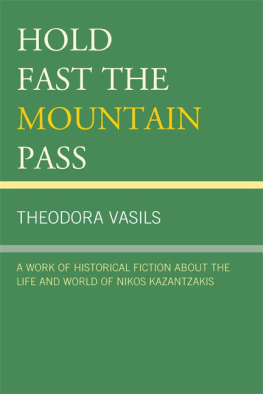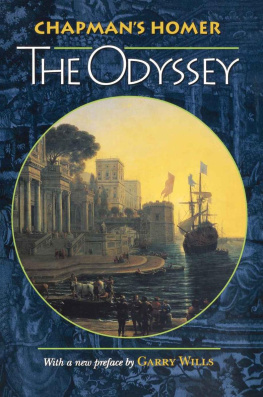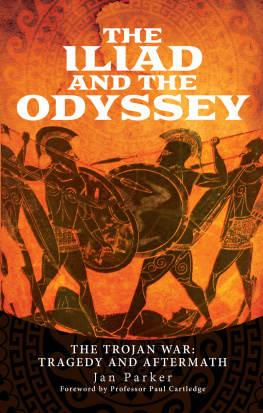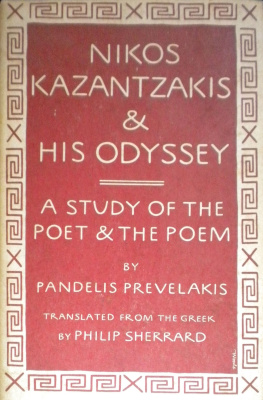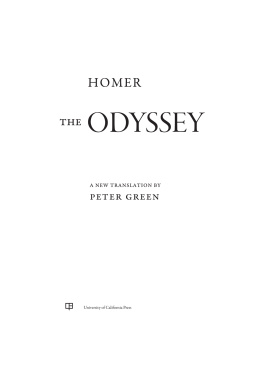THE ODYSSEYA Modern SequelbyNikos Kazantzakis Translated into English Verse, Introduction, Table index heading, and Notes by Kimon Friar Illustrations by Ghika This translation is for James Merrill
INTRODUCTION
I. A Modern Sequel to Homer
When in the winter of 1938, at the age of fifty-five, Nikos Kazantzakis first published his
Odyssey in Athens, it had long been awaited with intense anticipation, and was received with confused bewilderment. Expectation had run high during the twelve years since 1925 when he had worked and reworked through seven complex versions of what he hoped would be the final and best summation of his life and thought. Already he had taken his place among the greatest of modern Greek authors with his many prose and poetic dramas, his books of travel and philosophy, and his invaluable translations, including Dante's
Divine Comedy and Goethe's
Faust. Later, he was also to publish his translations into modern Greek of Homer's
Iliad and
Odyssey, but now he had dared to challenge, or so it seemed, the most sacrosanct of all poets not only by grafting his own epic firmly on Homer's poem, but also by giving it the same title and by continuing "the sufferings and torments of renowned Odysseus" in a modern sequel three times the size of his predecessor's original. He had even dared to attempt this in an age in which, all scholars were agreed, it was no longer possible to compose a long narrative poem based on myth. The critics now found themselves confronted by a huge tome of 835 pages (subsidized by an American patron, Miss Joe Mac Leod), 10 by 15 inches in size, handsomely printed in a special type, limited to an edition of 300 copies, written in 24 books (one for each letter of the Greek alphabet), and in 33,333 lines of an extremely unfamiliar seventeen-syllable unrhymed iambic measure of eight beats.
Furthermore, the poem was filled with disturbing innovations and seemed to depart from tradition in every conceivable way, for the poet had chosen to publish it in a form of simplified spelling and syntax which he had long advocated, analogous in English to the experiments of Robert Bridges in The Testament of Beauty. Worse, he had ruthlessly cut away the atrophied yet hallowed accentual marks imposed on ancient Greek by Byzantine scholars, retaining only the acute accent for certain syllables in order to indicate stress, much as in Spanish. Blood had been spilled and scholars deposed from their chairs at the University of Athens for proposing similar linguistic simplifications. But most distressing of all to Athenian intellectuals was to be confronted with a special lexicon of almost 2,000 words appended to the poem and meant to elucidate a diction and an idiom with which they found themselves disconcertingly unfamiliar, although (as I was later to attest) these words and phrases were in daily and familiar use by shepherds and fishermen throughout the islands and villages of Greece, or imbedded in their folk songs and legends. Even then, however, there were many who hailed the book for what it wasthe greatest of modern Greek poems and a masterpiece of the modern world. Yet it was inevitable that most critics, confronted with a work of such scope, should shy away from considerations of its meaning and its poetic worth and preoccupy themselves with its exterior manifestations, its strange spelling, its unfamiliar diction, its lack of accentual marks, its unusual measure, and primarily with its "anti-classical" style and structure. The appearance of Kazantzakis' Odyssey, in short, created as much furor in Greek circles as the publication in English circles of another epic of comparable proportions and intent, the Ulysses of James Joyce.
Both works are concerned with the modern man in search of a soul, and both utilize the framework of Homer's Odyssey as reference, though in strikingly different ways. In a recent work, The Ulysses Theme, Dr. W. B. Stanford, Regius Professor of Greek at the University of Dublin, traces the permutations of Odysseus in literature from Greek, Hellenic, Alexandrian, Roman, Renaissance, Medieval and Modern times through almost three thousand years of changing development, and then devotes his last chapter to a consideration of Kazantzakis' Odyssey and Joyce's Ulysses as "the most elaborate portraits of Odysseus in the whole post-Homeric tradition," as "unusually comprehensive symbols of contemporary aspirations and perplexities," and concludes that Kazantzakis' Odyssey "offers as much scope for ethical, theological, and artistic controversy as Joyce's Ulysses." He asserts that both works justify their bulk by their complex development of the theme's content and symbolism, and that it says much for the vitality of the myth that its greatest extensions should have emerged almost three thousand years after its first appearance in literature. Kazantzakis, Dr.
Stanford continues, "has found many new ways of understanding Odysseus in terms of modern thought," and has presented "a fully integrated portrait of the heroas wanderer and politician, as destroyer and preserver, as sensualist and ascetic, as soldier and philosopher, as pragmatist and idealist, as legislator and humorist," combining many scattered elements in both ancient and modern traditions until the episodic and spatial enrichments of the myth "are augmented on a scale, both physical and imaginative, far beyond any contributions since Homer's." In his characterization of Odysseus, Kazantzakis has, of course, derived many of his hero's qualities and adventures from the early Greek epic, but in essence, Dr. Stanford believes, "his Odysseus is an avatar of Dante's centrifugal hero, and derives from the tradition which leads from Dante through Tennyson and Pascoli to the present day." In the twenty-sixth canto of Dante's Inferno, Odysseus speaks from a two-forked tongue of flame: "Neither fondness for my son, nor reverence for my aged father, nor due love that should have cheered Penelope could conquer in me the ardor that I had to gain experience of the world and of human vice and worth; I put forth on the deep sea, with but one ship, and with that small company which had not deserted me.... 'O brothers,' I said,... 'deny not experience of the unpeopled world beyond the Sun. Consider your origins: ye were not formed to live like brutes, but to follow virtue and knowledge.' " Dr. Stanford finds that Kazantzakis' Odysseus is closer to Tennyson's in essence, "for though Tennyson makes his hero's expressed desire 'To follow knowledge, like a sinking star, / Beyond the utmost bound of human thought,' yet his immediate motive is to free himself from his domestic environment in Ithaca." This is similar to the thought of the great Greek-Alexandrine poet Constantine Cavafis, who in his poem Ithaca wrote that what was meaningful for Odysseus was not the arrival in Ithaca but the enriching experiences of the voyage itself, for when the mariner comes to understand that Ithaca has given him the beautiful voyage, that without her in mind he would never have set out on his way, and that she has nothing more to give him now, then he will have understood "what an Ithaca means." And in Book XVI of Kazantzakis' poem, Odysseus exclaims: "My soul, your voyages have been your native land!" Dr.
Stanford believes that "Kazantzakis has singled out the wish to be free as the dominant passion of his hero. In fact, psychologically, his epic is an exploration of the meaning of freedom." Throughout his poem Kazantzakis explores the meaning of freedom in all its implications of liberation, redemption, deliverance, and salvation. "Odysseus," he once said in a newspaper interview, "is the man who has freed himself from everything-religions, philosophies, political systemsone who has cut away all the strings. He wants to try all the forms of life, freely, beyond plans and systems, keeping the thought of death before him as a stimulant, not to make every pleasure more acrid or every ephemeral moment more sharply enjoyable in its brevity, but to whet his appetites in life, to make them more capable of embracing and of exhausting all things so that, when death finally came, it would find nothing to take from him, for it would find an entirely squandered Odysseus." Kazantzakis has expressed the last part of this thought in verse in the beautiful opening to Book XXIII, lines 27-37, and in these courageous ten lines he has written his own best epitaph. After considering the development of Odysseus in vernacular plays, lyrics, novels, and moral discourses, Dr. Stanford concludes that "Joyce's prose narrative and Kazantzakis' poem are nearer to heroic epic than to any of these genres.
Next page
